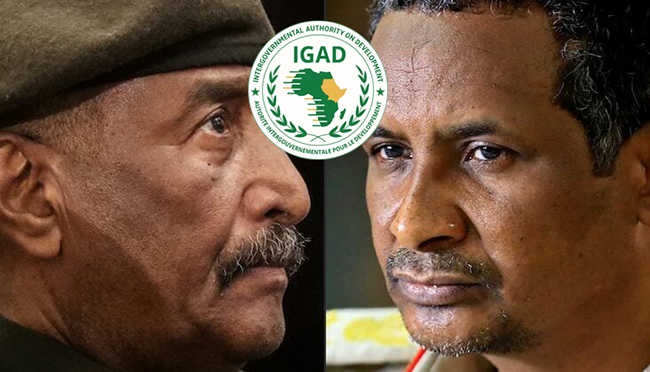
Kampala Summit: Elaborating the Maneuver of ``Proof`` Between the ``Yes`` and ``No`` Stations!
Abdullah Rizk Abu Seimazah
As the accursed war enters its tenth month, approaching the year, it seems that the latest developments on the battlefield include the emergence of popular resistance that has not been tested yet. This comes after the withdrawal of the army forces from the capital of the Gezira state, Khartoum.
However, the crystallization of popular resistance, as a form of mobilization, and the framing and regulation of the role of Islamists and their allies from the remnants of the ousted regime in the war, for the purpose of sustaining and expanding its scope to the level of a civil war, are not linked to a strategic shift in the armys position from defense to offense.
While the army continues to defend its positions, popular resistance, as proposed, is the organization of citizens to defend themselves and their properties when the Rapid Support Forces enter their areas, activating confrontation instead of avoiding it through agreements with them, as happened in Ruhayd, Al-Hilalia, Rifaa, and others.
This development, which is growing and escalating from limited states in the north and east, with the approval of the army leadership, raises questions about its ability to bring about tangible change in the course of the war or in the balance of power on the ground. This could enhance the chances of a military resolution to the battle. In the absence of any concrete certainty in this regard, it seems that the only option for al-Burhan is negotiation to end the war. The Kampala meeting might be the last opportunity for a peaceful solution. Perhaps it is appropriate to wait until the morning of Thursday, January 18th, to clarify al-Burhans true position on participating in the IGAD summit, hosted by the Ugandan capital on that day.
The conclusions drawn from reading the statement of the Transitional Sovereignty Council, rejecting the invitation addressed to it by the organizations presidency, seem hasty. The statement officially responding to the invitation skillfully avoided a direct and explicit answer of acceptance or rejection. Instead, it chose to change the subject by criticizing the shortcomings of IGAD in implementing the outcomes of the Djibouti summit and downplaying the importance of holding the Kampala summit before implementing the outcomes of the Djibouti summit. This eventually hinted at rejecting external initiatives, considering the problem internal and to be addressed internally by Sudanese themselves. Leaving everyone free to speculate on the final position is a significant maneuver for al-Burhan between the "Yes" and "No" stations.
This negative response, which has been widely interpreted as a refusal to participate in the Kampala summit, contradicts the position announced by the Ministry of Foreign Affairs at the same time the statement was issued. During a meeting with the UN envoy, the government of the fait accompli affirmed its commitment on the Jeddah platform. However, it generally aligns with the "policy of having two conflicting discourses," one for external consumption and another for internal use. A careful reading of the statement can sense a kind of bidding for the keenness to meet the generals. The irony lies in that the negative stance, deduced from the presidential statement expressing protest against the failure to implement the outcomes of the Djibouti summit, organizes a meeting between the generals, making the implementation of those outcomes, i.e., the meeting, a condition for holding the summit.

